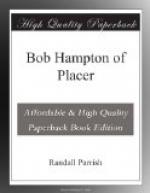Twice those fierce red horsemen tore down upon them, forcing the thin, struggling line back by sheer strength of overwhelming numbers, yet no madly galloping warrior succeeded in bursting through. The hot brown barrels belched forth their lightnings into those painted faces, and the swarms of savagery melted away. The living sheltered themselves behind the bodies of their dead, fighting now in desperation, their horses stampeded, their ammunition all gone excepting the few cartridges remaining in the waist-belts. From lip to lip passed the one vital question: “In God’s name, where is Reno? What has become of the rest of the boys?”
It was four o’clock. For two long hours they had been engaged in ceaseless struggle; and now barely a hundred men, smoke-begrimed, thirsty, bleeding, half their carbines empty, they still formed an impenetrable ring around their chief. The struggle was over, and they realized the fact. When that wave of savage horsemen swept forth again it would be to ride them down, to crush them under their horses’ pounding hoofs. They turned their loyal eyes toward him they loved and followed for the last time, and when he uttered one final word of undaunted courage, they cheered him faintly, with parched and fevered lips.
Like a whirlwind those red demons came,—howling wolves now certain of their prey. From rock and hill, ridge, ravine, and coulee, lashing their half-crazed ponies, yelling their fierce war-cries, swinging aloft their rifles, they poured resistlessly forth, sweeping down on that doomed remnant. On both flanks of the short slender line struck Gall and Crazy Horse, while like a thunderbolt Crow-King and Rain-in-the-Face attacked the centre. These three storms converged at the foot of the little hill, crushing the little band of troopers. With ammunition gone, the helpless victims could meet that mighty on-rushing torrent only with clubbed guns, for one instant of desperate struggle. Shoulder to shoulder, in ever-contracting circle, officers and men stood shielding their commander to the last. Foot by foot, they were forced back, treading on their wounded, stumbling over their dead; they were choked in the stifling smoke, scorched by the flaming guns, clutched at by red hands, beaten down by horses’ hoofs. Twenty or thirty made a despairing dash, in a vain endeavor to burst through the red enveloping lines, only to be tomahawked or shot; but the most remained, a thin struggling ring, with Custer in its centre. Then came the inevitable end. The red waves surged completely across the crest, no white man left alive upon the field. They had fought a good fight; they had kept the faith.
Two days later, having relieved Reno from his unpleasant predicament in the valley, Terry’s and Gibbons’s infantry tramped up the ravine, and emerged upon the stricken field. In lines of motionless dead they read the fearful story; and there they found that man we know. Lying upon a bed of emptied cartridge-shells, his body riddled with shot and mutilated with knives, his clothing torn to rags, his hands grasping a smashed and twisted carbine, his lips smiling even in death, was that soldier whom the Seventh had disowned and cast out, but who had come back to defend its chief and to die for its honor,—Robert Hampton Nolan.




